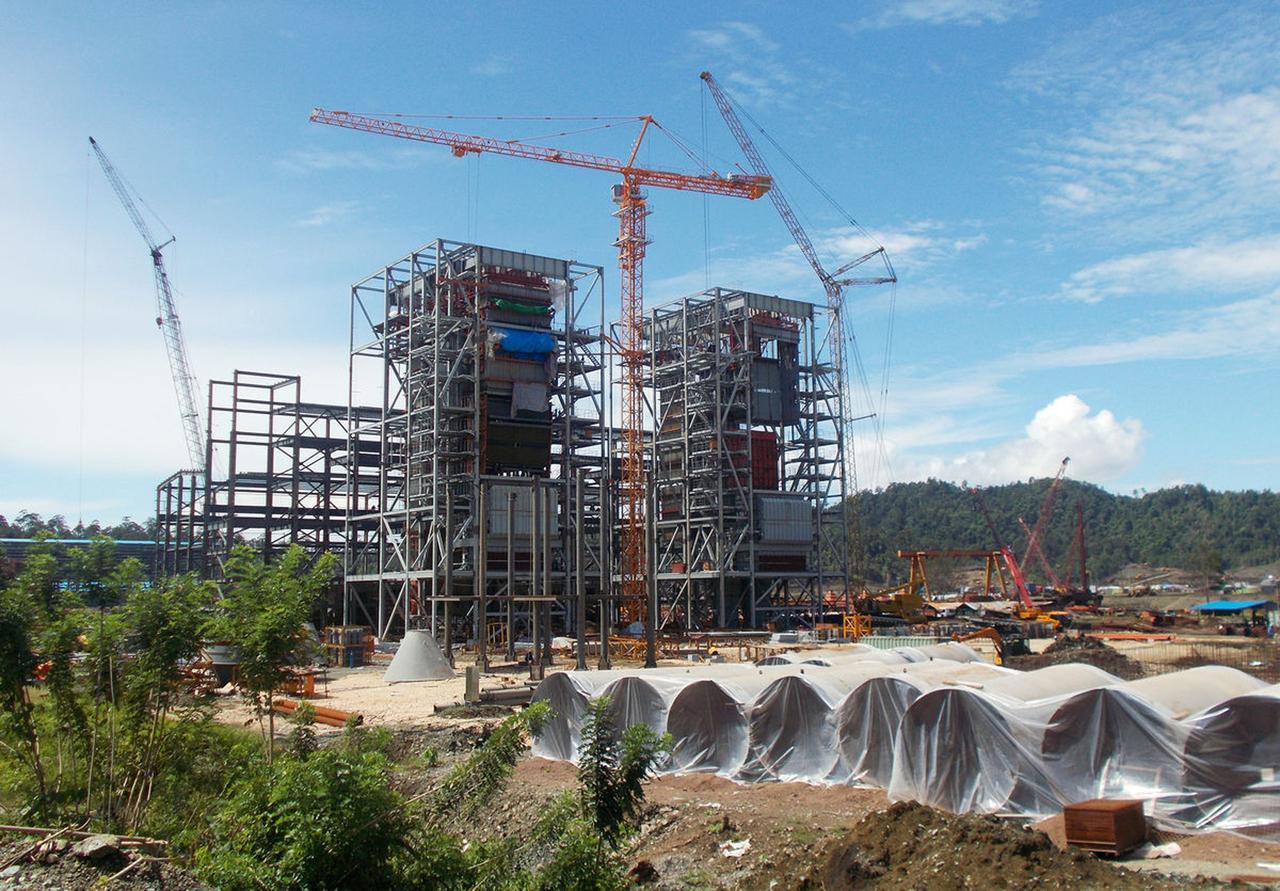China's overseas coal pledge working but Indonesia projects a concern, study finds
Sign up now: Get insights on Asia's fast-moving developments

A coal-fired power plant under construction at Sulawesi Mining's smelter project site in Morowali, Indonesia.
PHOTO: BLOOMBERG NEWS
SINGAPORE - Beijing's 2021 pledge to end support for new overseas coal power plants has led to 15 China-backed projects being shelved or cancelled, with the potential for another 32 being halted as well, an analysis published on Friday (April 22) shows.
The study by the Centre for Research on Energy and Clean Air (Crea) - a research organisation registered in Finland with staff across Asia and Europe - finds that China's pledge is having an impact on its coal investments abroad and influencing host country energy policies.
The majority of the 15 plants being shelved or cancelled were a result of revised domestic energy plans. For example, Vietnam in late 2021 postponed 6.6 gigawatts (GW) of coal projects beyond 2030, making it unlikely that such plants will ever be built, the authors say.
But Crea also found that 18 projects elsewhere with a capacity of 19.2GW that have secured financing and permits could still go ahead. These include coal investments in Indonesia that are linked to China-backed steel and nickel complexes.
These coal plants could proceed because of a loophole, the authors say.
Ending financial support for coal plants is regarded as a key tool in global efforts to reduce the threat from climate change because burning coal is the single largest source of greenhouse gas emissions heating up the planet.
Coal burning is also a major source of deadly air pollution.
China, Japan and South Korea are among the top funders of coal plants overseas but have come under intense pressure from the United Nations, green groups and others to end their support. Major global banks are also backing away from coal.
Last September, President Xi Jinping told the UN that China would not build new coal-fired power plants abroad. The government's influential National Development and Reform Commission (NDRC) and three other ministries followed up this pledge with a policy paper in March on the greening of the Belt and Road Initiative (BRI).
They said new coal-related projects will be completely stopped, covering projects with financing and/or equipment, procurement and construction contracts. Projects already under construction should proceed with great caution.
"China's pledge is working and the new NDRC guidelines should signal the end of coal overseas and an impetus for both Chinese firms and host countries to convert and cancel more coal projects," said Ms Isabella Suarez, South-east Asia analyst for Crea and lead author of the analysis.
The new NDRC guidelines suggest that 32 plants, totalling 37GW, of the overseas Chinese-backed coal projects could be stopped because they have yet to secure all the permits and/or financing. This would mean scrapping more than a third of coal projects planned outside China and India, the report says.
The additional group of 18 plants totalling 19.2GW fall into a grey area of China's pledge because they have the necessary permits and finance but have not broken ground.
Of these, 8GW are proposed captive coal projects linked to BRI nickel and steel complexes in Indonesia. Captive plants provide power to industrial customers and are not connected to the grid.
Two projects in Indonesia are of particular concern, Ms Suarez told The Straits Times, because the approvals seem to have been granted after Mr Xi's pledge.
One is a 1,520 megawatt (MW) thermal power project on Obi Island, North Maluku province, to support nickel-cobalt processing. The other is a 1,140MW expansion of an existing coal plant expected to power steel and nickel processing at the Morawali Industrial Park in Central Sulawesi province.
"The loophole is whether BRI developments with earmarked coal power plants in their original proposals are covered by (President Xi's) pledge. Both projects in Indonesia are part of nickel and steel complexes that have been years in the making," said Ms Suarez.
China does not consider these to be "new" even though the tenders and contracts are being negotiated and signed after Mr Xi's pledge, she said, which should reasonably classify them as "new" coal.
"So far, Indonesia is an outlier because captive coal plants are a priority for the government. As far as we can tell, this isn't happening anywhere else but it sets a dangerous precedent."
The report notes that China has plans to build 50 special economic zones across Asia and Africa.
Overall, though, Ms Suarez said China's coal pledge has the potential to influence governments, especially BRI host governments, to rethink their energy policies and shift to cleaner energy.
She added that China has signed a record number of renewable energy contracts, an indication that it is also moving fast in this area overseas.
But she said there is still a danger that projects will go from coal to other fossil fuels, such as gas, "especially if host countries are actively promoting such technologies in their power development plans and courting investments".
But the overall trend is clear, she added.
"Countries and firms should heed the combination of signs: changing policies, the trend in coal cancellations outpacing construction, increasing instability of grids due to over-dependence on coal, volatility in power and commodity markets, and the growing threat of climate change."


